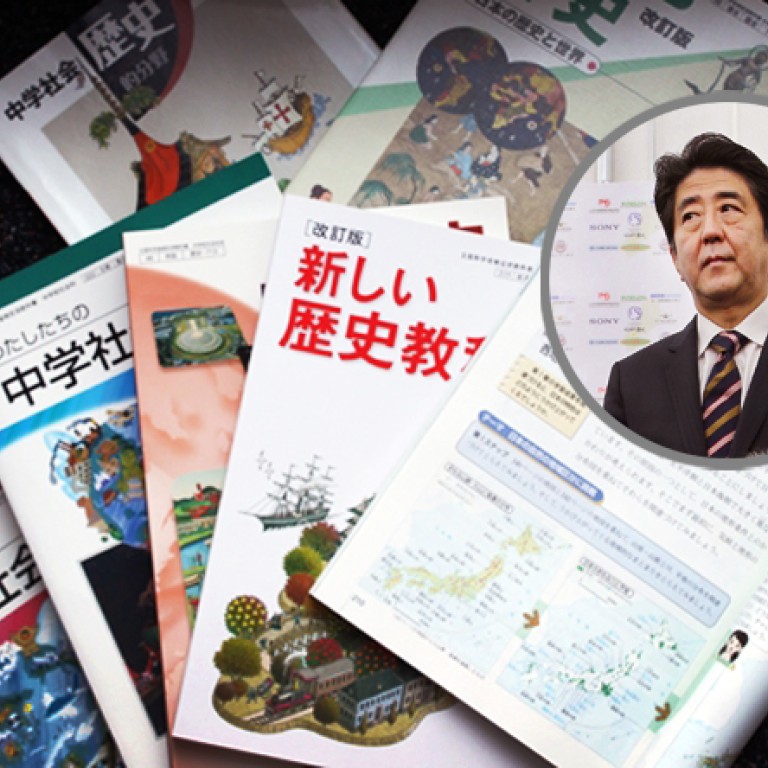
Japanese PM Shinzo Abe wants more patriotic tone in school textbooks
Prime minister is pursuing a more conservative agenda on education, backing changes in how Japan's second world war record is taught
Prime Minister Shinzo Abe's conservative government has begun to pursue a more openly nationalist agenda on an issue that critics fear will push the country further from its postwar pacifism: adding a more patriotic tone to Japan's school textbooks.
The proposed textbook revisions have drawn less outcry abroad than Abe's visit on Thursday to a shrine that honours war dead, including war criminals from the second world war. However, although Abe's supporters argue that changes are needed to teach children more patriotism, liberals warn that they could undercut an anti-war message that they say has helped keep Japan peaceful for decades.
"Prime Minister Abe is feeling the heat from his political base, which feels betrayed that he has not pursued a more strongly right-wing agenda," said Nobuyoshi Takashima, a professor emeritus at the University of the Ryukyus in Okinawa who has studied the politics of textbooks. "Classrooms are one place where he can appease ultraconservatives by taking a more firmly nationalist stance."
Abe and the nationalists have long argued that changes in the education system were crucial to restoring the country's sense of self, eroded over decades when children were taught what they call an overly negative view of Japan's wartime behaviour.
The latest efforts for change started slowly, but have picked up speed in recent weeks.
In October, Abe's education minister ordered the school board in Taketomi to use a conservative textbook that it had rejected, the first time the national government has issued such a demand. In November, the Education Ministry proposed new textbook screening standards, considered likely to be adopted, that would require the inclusion of nationalist views of wartime history.
This month, a government-appointed committee suggested a change that would bring politics more directly into education: putting mayors in charge of their local school districts, a move that opponents say would increase political interference in textbook screening. And just days ago, an advisory committee to the Education Ministry suggested requiring that textbooks that do not nurture patriotism be rejected.
The new screening standards proposed by the education minister, Hakubun Shimomura, a long-time advocate for teaching patriotism, require that primary and secondary school textbooks give a "balanced picture" of disputed historical facts.
In an interview, ministry officials said that in practice this would require that textbooks include viewpoints of nationalist scholars on two highly contested historical issues. One is the death toll of the 1937 Nanking massacre of Chinese civilians by Japanese soldiers. The Chinese government puts it at 300,000, a figure many Japanese scholars see as grossly exaggerated.
Textbooks would also be required to state that there is still a dispute about whether the Japanese army played a direct role in forcing so-called comfort women from Korea and elsewhere to provide sex to its soldiers.
Educators worry that the vague wording of the standards could lead to more widespread changes in tone.
The suggested changes follow years of nationalist attempts - long backed by Abe - to whittle away at negative depictions of Japan's wartime activities. Those who oppose textbook revisions say they are beginning to see the contours of a new strategy: forcing change at the local level that has sometimes failed at the national level.
Taketomi, a township of eight tiny islands, appears to have become ground zero for that battle.
The trouble began two years ago, when a newly elected conservative mayor on the neighbouring island of Ishigaki appointed a new head of a local education district, who selected a social studies textbook published by a right-wing company. Taketomi, whose school system is part of that district, immediately rejected the book.
Since Abe's conservative Liberal Democratic Party returned to power last year, analysts say, members of his government have been determined to make an example of Taketomi in a campaign to roll back what they call a tilt to the left in education.
Survey says Abe should heed fallout from shrine visit
A majority of Japanese voters want Prime Minister Shinzo Abe to heed the diplomatic fallout after his visit to a controversial war shrine, but nevertheless largely approved of his job performance, a weekend poll showed. In a telephone survey conducted by Kyodo News, 69.8 per cent of respondents said the conservative leader should pay attention to the implications of his recent surprise visit to the Yasukuni shrine. It also showed that 47.1 per cent said it was "not good" that Abe visited the shrine. The news agency did not say how many people participated in the nationwide survey. Abe's approval rating remained unchanged from a similar survey taken a week ago, a few days before he went to Yasukuni, Kyodo said, while the disapproval rating for Abe's cabinet slightly fell to 32.6 per cent from 33.0 per cent. The poll also found that 71.2 per cent of respondents said that prefectures outside of Okinawa should host military drills involving the US Marine Corps' Osprey tilt-rotor aircraft, currently deployed at Futenma Air Station in the southern island prefecture. Okinawa reluctantly hosts most of the US soldiers based in Japan, and the Osprey is viewed in Japan as prone to accidents. The survey was taken after Okinawa on Friday approved an unpopular relocation plan of the Futenma facility, a step that could facilitate a wider US military realignment in the Asia-Pacific region.
